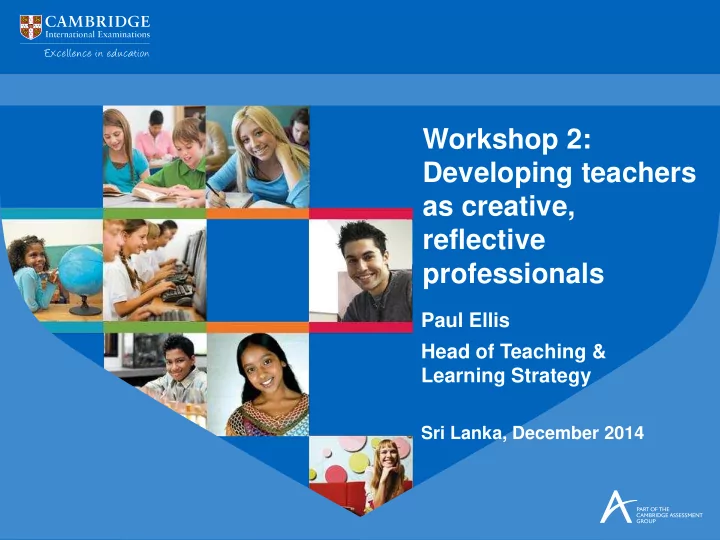

Workshop 2: Developing teachers as creative, reflective professionals Paul Ellis Head of Teaching & Learning Strategy Sri Lanka, December 2014
Being reflective To develop professionally, you must be able to reflect on your practice That reflection can be superficial... ‘I think it went well’, ‘The children enjoyed it’ ... or over- focused on behaviour and ‘order’ ‘The children behaved well’ ‘The class was silent for most of the lesson which was good’ The key issue in your classroom is children’s learning Your reflection should be primarily focused on this.
‘We do not learn from experience… …we learn from reflecting on experience’. Dewey, 1938
Some Reflective Models…. ‘Learning by Doing: A guide to teaching and learning methods’ Gibbs, 1988
The Reflective Cycle Design Apply Evaluate Practise Learn Do Assess Review
PD spiral
The Cambridge teacher Confident Engaged Responsible Innovative Reflective
Six components of great teaching 1. (Pedagogical) content knowledge Of material and how students think about the content 2. Quality of instruction Including effective questioning, assessment, scaffolding 3. Classroom climate Interactions, demanding more, success from effort 4. Classroom management Time, behaviour, resources, environment 5. Teacher beliefs Theories of learning, nature & role of teaching 6. Professional behaviours Reflection, development, support, communication From “What makes great teaching?” – Coe et al., Durham University, October 2014
Professional development What good/bad experiences have you had of training & PD? What future training and PD would you like and how/when What training will you and PD do you evaluate it? currently do and how useful is it?
SWOT/SMART/OPERA SMART targets S pecific M easurable A chievable R esourced T ime-framed OPERA goals O bjective P arameters E ffects R esources A ccountability
“He who can, does. He who cannot, teaches.” George Bernard Shaw – Man and Superman (1903), “Maxims for Revolutionists” “Those that know, do. Those that understand, teach” Aristotle “Those who can’t do, teach. And those who can’t teach, teach gym .” Woody Allen, Annie Hall
Recommend
More recommend